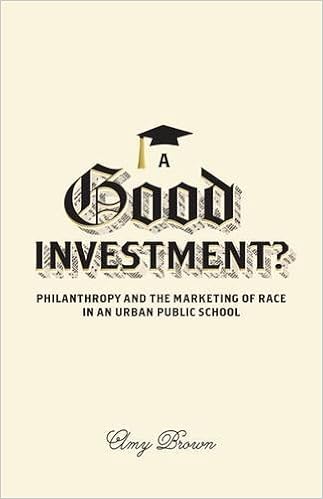Earlier this month, I had the opportunity to attend a book reading by Amy Brown, author of "A Good Investment?: Philanthropy and the Marketing of Race in an Urban Public School." Ms. Brown has written a really insightful and brutally honest ethnography on her experiences embedded in a New York City school that serves predominantly students of color. Her remarks focused a lot on how staff "performed" when before potential funders, versus how things were normally, and how much effort was put into telling a consistent and persuasive narrative about how donations would help disadvantaged kids to succeed.
As someone who dabbles in philanthropy, race, and education, the intersection of the three made for a fascinating discussion. It elicited in me a question that time will provide the answer to, which is how enlightened and effective philanthropy can be in the future. I am grossly over-generalizing here to keep things simple, but it seems to me that there are two major subsets of philanthropists out there (not trying to denigrate or dismiss present-day funders who are in neither camp). First is old money, which is familiar with old race/income/class hierarchies and old patterns of philanthropy based on those hierarchies. Second is new money, which prides itself on the "self-made man" archetype and seeks giving venues that help make that happen for others less resourced.
Cutting through today's burdens and injustices is obviously more racially and socially nuanced than these two perspectives, and there are some great funders out there today who get that. But, a pretty big chunk of philanthropic dollars doesn't behave that way, and hence you get the performances and narratives described in Ms. Brown's book. The question on my mind, which I don't know the answer to (I waffle between being hopeful and being depressed), is when today's young people hit it big and become tomorrow's captains of philanthropy, will their giving efforts be suitably informed or will they too engender carefully scripted performances in order to extract their dollars?
Sometimes I am hopeful for today's youth, because they are growing up with unprecedented appreciation for diversity, access to information, and motivation to be "woke." But sometimes I am depressed, because I see a denial of the complexities of race/income/class and can extrapolate from that that they too will grow up being blind to and unconsciously contributing to existing disparities. As I said above, time will tell. I am holding my breath.
73-91 born SEA lived SJC 00 married (Amy) home (UCity) 05 Jada (PRC) 07 Aaron (ROC) 15 Asher (OKC) | 91-95 BS Wharton (Acctg Mgmt) 04-06 MPA Fels (EconDev PubFnc) 12-19 Prof GAFL517 (Fels) | 95-05 EVP Enterprise Ctr 06-12 Dir Econsult Corp 13- Principal Econsult Solns 18-21 Phila Schl Board 19- Owner Lee A Huang Rentals LLC | Bds/Adv: Asian Chamber, Penn Weitzman, PIDC, UPA, YMCA | Mmbr: Brit Amer Proj, James Brister Society
Subscribe to:
Post Comments (Atom)
Drive Has Always Been the Difference
Last month Google announced “Learn Your Way,” which they state will revolutionize the educational experience by providing you...

-
PHILADELPHIA NAMED BEST CITY FOR NEW GRADS How about Philly besting Boston, New York, Chicago, Atlanta, and every other city in America for ...
-
I recently had a humorous but telling incident on my bus ride into work. It being rush hour, the vehicle is often crowded and even standin...


No comments:
Post a Comment